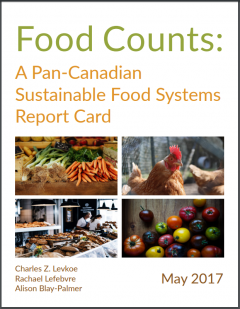Reposting from Wilfrid Laurier University
 WATERLOO – Researchers at Wilfrid Laurier University, Lakehead University and the University of Toronto have taken a first step toward producing a comprehensive report card on the sustainability of Canada’s food systems.
WATERLOO – Researchers at Wilfrid Laurier University, Lakehead University and the University of Toronto have taken a first step toward producing a comprehensive report card on the sustainability of Canada’s food systems.
Their new report, “Food Counts: A Pan-Canadian Sustainable Food Systems Report Card,” brings together 61 existing measures of social, environmental, and economic well-being to examine food systems at the national level. Unlike existing food systems report cards, which focus on isolated perspectives such as economic productivity or individual health outcomes, Food Counts builds on existing efforts to create an integrative set of measurements to assess whole food systems, taking a range of relevant factors into account, from ecological, economic, health, labour, and educational points of view. There are plans to update it regularly to track trends.

Dr. Charles Levkoe, Canada Research Chair in Sustainable Food Systems and assistant professor at Lakehead University.
“The Food Counts report card highlights the limitations of existing indicators and the need to reassess the way we approach and advocate for social justice, ecological regeneration, regional economies and active democratic engagement,” said Charles Levkoe, Canada Research Chair in Sustainable Food Systems and an assistant professor at Lakehead University. “There is a lot more research needed to understand the path towards sustainable food futures and this report card is a vital step in that direction.”
Some areas where Canada is doing well, from a social justice point of view, include that agricultural wages are going up while fatalities among farm workers are going down. More farms are using water conservation measures and more households are composting.
Areas where Canada is not doing as well include that fruit and vegetable consumption is going down and is lower than average among Indigenous peoples. A set basket of food is becoming more expensive and household food insecurity is going up, with food bank use also on the rise. There are fewer, older farmers on fewer, larger farms and they are in greater debt. Farmers are using more chemical fertilizers, herbicides and pesticides, and agricultural greenhouse gas emissions are going up.
“Developing sustainable food systems is complicated,” said Alison Blay-Palmer, director of the Laurier Centre for Sustainable Food Systems, Centre for International Governance Innovation Chair in Sustainable Food Systems and an associate professor at Laurier and the Balsillie School of International Affairs. “We need to think about how our food is grown or harvested, who has access to healthy food, and how these things impact our environment and local economies. This report card helps us understand where we are doing well, where we can improve, and where we need more information.”
The report was produced with funding from the Social Sciences and Humanities Research Council of Canada by the FLEdGE (Food: Locally Embedded, Globally Engaged) research and knowledge-sharing partnership, which is hosted at Laurier. Access the report on their website for more information. https://fledgeresearch.ca/foodcounts/.
